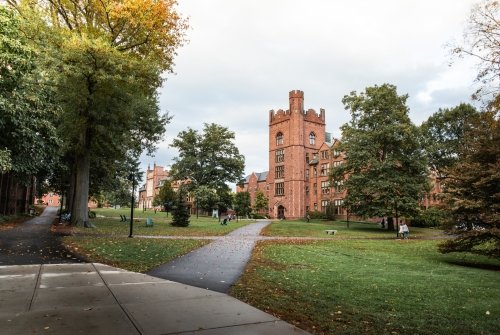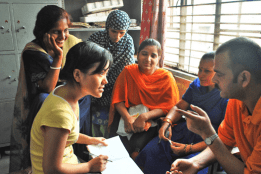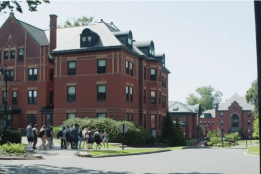
Campus Resources
As a student of Mount Holyoke College, you have many resources available to you. We are here to support you.
Academic centers

McCulloch Center for Global Initiatives
The McCulloch Center leads MHC’s commitment to expand students’ global competence through courses, international internships, study abroad and more.

Weissman Center for Leadership
The Weissman Center is dedicated to supporting our students in developing the skills and strategies they need to become inspiring and effective leaders.

Miller Worley Center for the Environment
Preparing environmental leaders for today and the future by promoting a culture of environmental sustainability and justice on campus and beyond.
Types of insurance carried by the College
The following information is provided to inform students about the insurance coverage that the College may purchase, and how the coverage may apply to students. The descriptions of coverage are not intended to, nor do they supplement, amend or modify any insurance policy terms and conditions. The College reserves the right at all times to modify its insurance coverage, terms, conditions and limits without notice to any person or entity, including students, faculty or staff. Students may wish to make adjustments in their own coverage if they feel that it would be appropriate to their interests.
The comprehensive fee covering tuition, room and board provides access to the services of:
- Mount Holyoke College Health Services.
- Mount Holyoke College Counseling Service.
Because a student may need more extensive medical treatment, medical insurance is required of all students by the commonwealth of Massachusetts, the federal Affordable Care Act (ACA) and Mount Holyoke College: mtholyoke.edu/health/student-illness-injury-plan.
A fee for Mount Holyoke College’s Student Health Insurance Program appears on the student's bill annually as the Mount Holyoke College Student Injury and Sickness Plan. If a family or student has other equivalent coverage that meets the requirements of comparable coverage set by the commonwealth of Massachusetts for the student, the student may submit information confirming the coverage via the Gallagher Student Health & Special Risk online waiver form, and if the coverage is acceptable, the insurance charge will be waived. This must be evaluated and action taken annually. Paper waivers are not accepted. More detail is available at Gallagher Student Health Insurance: gallagherstudent.com.
Payment for the Student Injury and Sickness Plan is administered by Student Financial Services.
College Health Services may assist with questions regarding claims at 413-538-2089. Benefits include emergency services, ambulance, in-patient and outpatient medical, surgical and mental health care, diagnostic testing, specialty consultation and pharmacy. There are copayments, deductibles and exclusions within the plan that will be the responsibility of the insured student. Students will be billed directly for services that are not covered by the Student Health Insurance Plan (SHIP) or for the fees that are patient responsibility. During the academic year, students must obtain a referral from Health Services or Counseling Service for coverage of nonemergency services outside of the Health Center.
During the academic year, students must obtain a referral from the Health Center or Counseling Service for coverage of nonemergency services outside of the Health Center.
Intercollegiate and club sports athletes have additional benefits available under certain policies that are purchased on their behalf by the College. Coverage applies to athletes who are injured while in organized competition or practice, which is constructively supervised, or traveling to or from one of these events. The NCAA policy insures varsity athletes for an unlimited amount (subject to policy terms) over the Sports Accident Policy, and benefits range from medical and rehabilitation to lifetime disability income and home health care. These policies do not extend to participants in intramural or any other recreational sports. They cover intercollegiate and College- recognized club sports only.
The College accepts no responsibility for any losses, costs or expenses not covered by the insurance policies listed above, whether by coverage terms or exclusions or the injured student’s failure to comply with policy-required claims procedures.
The College provides limited travel accident insurance, including medical evacuation and repatriation to students traveling worldwide on official College or academic business. Worldwide travel assistance services are also available.
Mount Holyoke College purchases auto liability insurance that protects both the College and the driver from third-party liability and third-party property damage arising from the use of College-owned, -hired/-rented and non-owned vehicles. All persons driving on College business must be credentialed.
The College auto insurance policy may not cover unauthorized drivers. Unauthorized drivers may be personally liable for claims brought against them. The College may also have a right to claim against unauthorized drivers. Note that there is no insurance coverage for students who drive personal vehicles.
The College is not responsible for, nor will it pay any claims for, damages to student-owned vehicles resulting from falling ice, snow, tree limbs or any other natural occurrence or event on its property or elsewhere, whether the possibility of such an event is warned against or not. The College is not responsible for, nor will it pay any losses, claims or damages to student-owned vehicles resulting from vandalism, collision or other acts by any person, other than damage caused directly by its employees.
The College does not have property insurance for student possessions, and it accepts no responsibility for any personal possessions or property of students. Any possessions in student rooms or left in storage areas are left at the owner’s own risk. Students are responsible for insuring their own property against loss and may be able to do so using a parent’s or guardian’s policies or by obtaining a tenant’s policy through a local insurance agent. It is recommended that students keep their doors locked and not leave valuable items in storage areas.
The College is not liable for the actions of its students, nor is it possible for the College to obtain liability insurance on behalf of its students. Student-athletes especially should be aware that if they are sued for injuries or damages caused to others in the course of an athletic event, Mount Holyoke’s insurance does not provide coverage. The liability section of a parent’s or guardian’s homeowner’s policy or renter’s policy may provide for the defense of the student and damages awarded, if any, in a suit alleging negligence. Students are responsible for avoiding intentional acts or negligent behavior that could harm others or give rise to adverse legal action. Although Mount Holyoke College will not provide liability protection, it may assist in obtaining a defense if it is not provided for by parental/guardian insurance coverage. If a student is sued for an act or omission and believes that they were acting in the capacity of an employee or agent of the College at the time of such act or omission, they should contact the dean of students immediately. The College will not provide any legal defense for any student accused or arrested for any criminal act, whether on or off campus, even if the student is on a field trip or other College function or program.
Students who are employed by the College and who are injured in the course of their work may be eligible for workers’ compensation. If a student is injured on the job, the student should contact their supervisor IMMEDIATELY to report the injury and complete an accident investigation form. Questions should be directed to the student’s supervisor and the Office of Human Resources.
For further assistance, students may contact the College’s compliance and risk management office. For more information on other student risk management issues, students may contact the Five College Risk Management website: fivecolleges.edu/riskmgmt.
Risk Manager
Five Colleges Incorporated
50 College Street
South Hadley, MA 01075-6404
Phone: 413-538-3092
Fax: 413-538-3031
Information and technology
Library Information and Technology Services (LITS)
Mount Holyoke’s Library, Information, and Technology Services (LITS) provides library and information technology support for the college. There are three library locations: Williston Library, Pratt Music Library, Language & Culture Commons. The general library collections support the curriculum, with strengths in gender and sexuality studies, interdisciplinary studies, and environmental and sustainability studies. The library spaces include group study rooms and a beautiful, welcoming reading room (a favorite with students) in an English Gothic architectural style.
LITS also boasts a robust archival collection located on the ground floor of Dwight Hall. Archives and Special Collections documents the history of Mount Holyoke College through letters, photographs, scrapbooks, departmental records, and artifacts. Students are welcome to visit and use the primary research materials and Rare Books Collection.
As a part of the institution’s physical facilities and academic and social infrastructure, Mount Holyoke College acquires, develops and maintains computers, computer systems and networks. These resources are owned by the College and intended for College-related purposes, including direct and indirect support of the College’s teaching and research, administrative functions, student and campus life activities, and the free exchange of ideas among members of the College community and between the College community and the wider local, national and world communities.
The rights of academic freedom and freedom of expression apply to the use of College computing resources, as do the responsibilities and limitations associated with those rights. The use of College computing resources, like the use of any other College-provided resource or College-related activity, is subject to the normal requirements of legal and ethical behavior within the College community.
Legitimate use of a computer, computer system or network does not extend to whatever is technically possible. Users must abide by all applicable restrictions, whether or not they are built into the operating system or network, and whether or not they can be circumvented by technical means.
All users of College computing resources must:
- Comply with all federal, state and other applicable law, all applicable College rules and policies and all applicable contracts and licenses.
- Use only those computing resources that they are authorized to use and use them only in the manner and to the extent authorized.
- Respect the privacy of other users and their accounts, regardless of whether those accounts are securely protected.
- Respect the finite capacity of the College’s resources and limit use so as not to consume an unreasonable amount of those resources or to interfere unreasonably with the activity of other users.
- Refrain from using those resources for personal commercial purposes or personal financial or other gain not related to the mission of the College.
- Refrain from stating or implying that they speak on behalf of the College and from using College trademarks and logos without authorization to do so.
- Be attentive to computer problems that may be the result of malware, viruses, spyware, keystroke loggers or other invasive software.
Respect for intellectual labor and creativity is vital to academic discourse and enterprise. This principle applies to works of all authors and publishers in media. It encompasses respect for the right to acknowledgement, right to privacy, and right to determine the form, manner and terms of publication and distribution. Because electronic information is volatile and easily reproduced, respect for the work and personal expression of others is especially critical in computer environments. Violations of authorial integrity, including plagiarism, invasion of privacy, unauthorized access, and trade secret and copyright violations, may be grounds for sanctions against members of the academic community.
The College employs various measures to protect the security of its computing resources and of users’ accounts. Users should be aware, however, that the College cannot guarantee such security. Users should engage in safe computing practices by establishing appropriate access restrictions for their accounts, including appropriate selection and safekeeping of passwords. Users should also be aware that their uses of College computing resources are not completely private. The normal operation and maintenance of the College’s computing resources require the backup and caching of data and communications, the logging of activity, the monitoring of general usage patterns and other such activities that are necessary for the provision of service. Such audits may review the sizes, kinds and names of software and files, but do not review the contents of documents. While in general content is not reviewed, it is important to understand that all information related to the business of the College is owned by the College. See the acceptable use policies page for more information.
To encourage active engagement and academic inquiry in the classroom, as well as to safeguard the privacy of students and faculty, no form of audio or visual recording in the classroom is permitted without explicit permission from the professor/instructor or without a letter from AccessAbility Services, signed by the faculty member, authorizing the recording as an accommodation. Authorized recordings may only be used by a student who has obtained permission and may not be shared or distributed for any reason. Violation of this policy is an infraction of the Mount Holyoke College Honor Code and academic regulations and will result in disciplinary action.
Other resources

Student Financial Services
The Office of Student Financial Services handles all aspects of student bills and financial aid.

Student Employment Office
The Student Employment Office of the Career Development Center coordinates the student employment program and administers the student employment database.

Disability Services
Disability Services coordinates and provides accommodations and support service to students with documented disabilities.